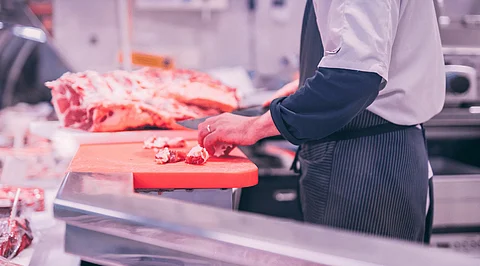

Already the driver behind advances in medicine, transportation, architecture, and much more, artificial intelligence's application to the artificial meat industry, however, could prove to be one of the most significant achievements for the technology. It's not very well advertised, but machine learning is changing the production of meat substitutes or 'vegan meat.' Older iterations of meat substitutes have been rated as acceptable by many but as desirable by few. –This is set to change; drastically. New high-tech meat substitutes created by startups – mostly in the extremely tech-friendly start-up hub of Israel – use AI algorithms to create what is fairly being called "the closest mimicry of animal protein ever manufactured by humans."
Reports say that over 70% of Americans have tried at least one plant-based meat alternative. One can find videos online showing people expressing shock after discovering the 'meat' they were eating was plant-based. That shock and awe, however, is about to level up significantly. The AI programs creating 'alt-meat' work in tandem with a 3D printer. By printing out layers with different consistencies, one section of a piece of artificial steak, for example, has a more muscular or chewy sensation, while another section of the steak provides a fattier, juicier taste experience. In combination, the results are being described, by people as diverse as celebrity chefs to your average meat lover, as stunningly tasty meat.
Cows alone are reportedly responsible for an estimated 14.5% of greenhouse gas emissions. The data is clear that reducing or eliminating meat would be a huge benefit to reducing climate change. But the human animal, like any other animal, is a creature of habit – and most of us rather enjoy eating meat. Not because it comes from a cow or some other animal, per se, but due to the unique flavors and textures that meat provides. Should those textures and flavors be satisfactorily recreated with the aid of AI and 3D printer tech, it's a relatively safe prediction that (at least) Millennials and Generation Z consumers will happily switch over to vegan options, which are arguably healthier for both us and the planet we live on.
Just over the horizon, analysts predict, AI tech will also begin to create specific food products that are tailored for those with specific health conditions or needs. Today, food companies put much effort into producing products that can be eaten by people with gluten allergies, who are lactose intolerant, or who may have some other dietary requirement. There's an old saying, "It's impossible to please all the people all the time." With AI, however, that should soon no longer be the case when it comes to food.
There are an estimated 250,000 plants that humans can consume. Despite having had many tens of thousands of years to figure out what plants we like and which ones we don't, we still don't fully understand the science behind what plants go together best and why. With artificial intelligence, it is becoming possible to break down the molecules of each edible plant. Then, again with the assistance of AI, databases can be created of what combinations are not only delicious but also nutritious.
Machine learning is on the cusp of bringing brand new flavors and taste sensations to dinner tables around the world while giving veganism a huge push forward by helping companies offer animal protein-free options…that people actually find desirable. In the end, most consumers vote with their hearts rather than their heads. If something tastes good and is also less expensive, it's unlikely many will be concerned that a kebab that looks, smells, and tastes like a kebab, for example, is not made out of lamb but rather from 100% plant-based ingredients.
It's exciting to consider future possibilities as the technology behind alternative meat is already producing such amazing results. But the whole point of machine learning is that it improves over time. Already taste experts and blind tasters have given new high-tech alt-meat ratings of 90% and higher for 'meatiness,' so just imagine where we could be in say, five years.
Ready-to-eat meals have a poor reputation in some circles, thought of as 'TV dinners' or one step up from junk food. However, in 2020, the segment brought in over US$400 million and is a market expected to grow by more than 5% annually through 2025. With the aid of AI, plant-based ready-to-eat meals could become the smartest way to get the exact amount of protein and nutrition into your specific body. –Call it a 'bespoke meal.'
There are still some mountains to climb. Vegan 3D printed meat is getting so good that it's now possible to 'fool' people into believing it's animal protein. But vegan cheese, for example, is not quite where it could be. –But don't bet against it. AI plant-based protein food production technology is very much still in its infancy. The future, most predict, is going to be vegan. And happily, thanks to artificial intelligence, that's not going to mean bland dishes of tofu and brown rice but rather crispy bacon, juicy steaks, sizzling kebabs, and virtually any other food item you can think of…all made from plants, and all made possible because of AI tech.
Join our WhatsApp Channel to get the latest news, exclusives and videos on WhatsApp
_____________
Disclaimer: Analytics Insight does not provide financial advice or guidance. Also note that the cryptocurrencies mentioned/listed on the website could potentially be scams, i.e. designed to induce you to invest financial resources that may be lost forever and not be recoverable once investments are made. You are responsible for conducting your own research (DYOR) before making any investments. Read more here.
